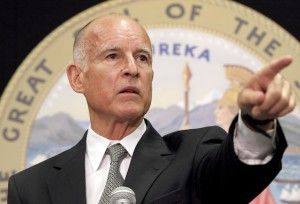Brown prevails over legislative Democrats in budget negotiations
Notching another victory against Democrats to his left on spending, Gov. Jerry Brown rebuffed party legislators pushing him to add last-minute items to the state’s budget.
“The final budget is $61 million more than Brown’s proposal in May,” the San Francisco Chronicle reported, “with most of the compromises reached in Tuesday’s deal with legislative leaders made through savings identified in the budget.”
The news was widely interpreted as a failure of nerve by legislative negotiators, who dutifully joined Brown to unveil the deal at a high-profile news conference. As the San Jose Mercury News surmised, “it quickly became clear that the Democratic leaders had blinked first — and just a day after the Legislature passed a more expensive version of the budget to express its ‘values.'”
But Democratic lawmakers claimed some important moral victories. Setting the stage for budgets to come, they secured funding for a host of entitlements and social services, many of which were groundbreaking in scope or purpose. Among states, for instance, California became “the first in the nation to offer state-subsidized health care to children who are in the country illegally,” the Wall Street Journal observed, and created “the state’s first income-tax credit for the working poor.”
More dollars were also allocated toward public education, preschool and childcare.
A governor on top
The outcome of the closely-watched negotiations underscored that Jerry Brown’s power in California remains uncontested. “In announcing the agreement, Brown said the deal preserves his general fund revenue forecast and overall spending levels,” the Sacramento Bee reported, calling it “a major concession by legislative leaders to the fourth-term governor.”
“Total general fund spending of $115.4 billion was only $61 million more than Brown originally proposed, not the $749 million more that legislative Democrats wanted. The total budget, including all funds, was set at $167.6 billion.”
Among the proposals Brown did away with were higher Medi-Cal reimbursements and permission for childcare workers to unionize, according to the Journal. But in addition to health subsidies for unlawfully present children, Brown approved increases for in-home caregivers. “The governor said he was able to fund those programs without adding to state spending by finding savings in a variety of other programs,” noted the Journal, “including fixing an accounting error in health spending.”
Even Brown’s concessions came with strictures. While Democrats across the negotiating table demanded over $400 million for 27,000 new low-income preschool or childcare opportunities, they had to settle for $265 million and some 14,000 slots, according to the Mercury News. “Brown also agreed to use $226 million in one-time money to restore a 7 percent reduction in service hours for recipients of state-funded home care.”
Pent-up politics
Lingering disagreement
For now, however, restive Democrats will have to go toe to toe with Brown at least one more time. “In addition to special sessions on roads and health care funding, Brown and legislators have yet to resolve a dispute over how to spend hundreds of millions of dollars in cap-and-trade revenue,” the Bee reported. “The Senate’s Democratic leaders are seeking about $500 million more in cap-and-trade spending than Brown proposed in May, mostly for greenhouse gas reduction-related programs benefiting disadvantaged communities.”
Earlier in the month, the contending sides tabled the controversy. But even that disagreement did not extend to the over $1 billion earmarked for transit costs including Gov. Brown’s prized high-speed rail project.
Related Articles
Hertzberg proposes $10 billion sales tax on services
An influential state lawmaker is proposing a $10 billion sales tax on services that would include everything from accounting to
Now New York fires a shot across California’s bow
Gov. Jerry Brown was not amused this past February when Texas Gov. Rick Perry made a four-day recruiting trip
Illegals Could Enjoy In-State Tuition
MAY 16, 2011 By KATY GRIMES Should illegal immigrants be allowed to access California’s higher education system at the same





